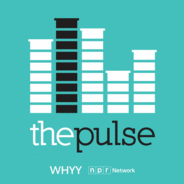On January 28, 1986, a frigid cold day with an icy blue sky, the Space Shuttle Challenger exploded just 73 seconds after launching from Cape Canaveral, Florida. The accident killed all seven crew members aboard and was the first fatal in-flight spacecraft disaster in NASA's history. For many, the explosion came as an absolute shock. Millions of people were watching live, including school children who were especially eager to catch a glimpse of Christa McAuliffe, a teacher from New Hampshire and the first civilian in space. On this episode, we remember the Challenger tragedy with author Adam Higginbotham who details what went wrong and the aftermath in his book, “Challenger: A True Story of Heroism and Disaster on the Edge of Space.”

Wissenschaft & Technik
The Pulse Folgen
Go on an adventure into unexpected corners of the health and science world each week with award-winning host Maiken Scott. The Pulse takes you behind the doors of operating rooms, into the lab with some of the world's foremost scientists, and back in time to explore life-changing innovations. The Pulse delivers stories in ways that matter to you, and answers questions you never knew you had.
Folgen von The Pulse
177 Folgen
-
Folge vom 26.01.2026Challenger at 40: How the Disaster Shaped the Future of NASA
-
Folge vom 22.01.2026Triumph, Tragedy and Ennui: Three NASA Missions That Shaped the Future of Space ExplorationSpace exploration relies heavily on the interest of the public — the voters, and taxpayers, who are ultimately footing the bill. But that support and excitement can be fickle. When space missions go well, and deliver new insights, the payoff is cheering crowds and increased support. But when they don’t, the result can be reduced funding, canceled missions — and even deaths.That means, with each mission, the pressure is on to push boundaries, break new ground, and get everything right. Even a small mistake or malfunction could potentially lead to absolute disaster.On this episode, we look back at three historic NASA missions and how they shaped the course of space exploration. From the awe-inspiring triumph of the first unmanned spacecraft landing on Mars in 1976, to a devastating national tragedy in 1986, to the long-game Pluto mission launched in 2006. It was the mission that was supposed to reignite the public's interest in the work of NASA — the Space Shuttle Challenger, an orbiter that, in January 1986, would carry six astronauts and one civilian, a teacher named Christa McAuliffe, into space. But on the day of lift-off, tragedy struck — the Challenger exploded 73 seconds after launch, killing all seven crew members. We talk with author Adam Higginbotham about what led up to the mission, what went wrong, and the lasting impact it had on both NASA and the public's perception of space exploration. He’s the author of “Challenger: A True Story of Heroism and Disaster on the Edge of Space.” In 2006, NASA launched New Horizons — an interplanetary space probe slated to become the first spacecraft to perform a flyby of Pluto, a journey of roughly 10 years. Pulse reporter Alan Yu tells the story of the mission's difficult beginnings, what we learned, and the dramatic moment that almost derailed everything.
-
Folge vom 15.01.2026The Weird Menopause Symptoms No One Ever Told You About — And How to Treat ThemIf you go by pop culture depictions, menopause seems like no big deal — a few hot flashes, some comical bouts of hormone-fueled rage, and the “big change,” as it was once called, is over. But for many of the 2 million American women who enter menopause each year, the symptoms can be a lot more serious and long-lasting, ranging from vertigo and joint pain to brain fog and heart problems.On this episode, we take a deep dive into perimenopause and menopause – what’s going on biologically? What can be done to ease symptoms? And why do so many women struggle to receive help from their doctors?We talk with menopause experts about hormone replacement therapy, and why it was demonized for many years; find out what researchers have discovered about the causes of brain fog; and hear about new efforts to deal with medically induced menopause. In this excerpt from our live event, Reimagining Menopause, host Maiken Scott talks with two certified menopause providers — Robyn Faye, an OB-GYN at Jefferson Health in Philadelphia, and Arina Chesnokova, assistant professor in of Obstetrics and Gynecology at the University of Pennsylvania’s Perelman School of Medicine — about the ins and outs of hormone therapy, which symptoms it alleviates, when it’s safe and when it’s not. Watch the full discussion here. Reporter Alan Yu talks with researchers about what’s behind one of the most vexing symptoms of menopause for many women — brain fog. For women who have cancer when they’re younger, especially breast or ovarian cancer, chemotherapy and other medications needed to treat the disease can affect hormones - and suddenly plunge them into menopause, years before they might naturally experience it. We explore what their options are, and why so many say they were not prepared for this change.
-
Folge vom 13.01.2026From Soy to Carbs: How Food can Ease Menopause SymptomsCapsule wardrobes have become a popular way to streamline and organize your closet — basically, paring it down to a few staple pieces that you can combine in multiple ways, and freshen up with seasonal accessories. Registered Dietitian Jenn Salib Huber says this is how women should think about nutrition during perimenopause and menopause. Rather than obsessing over calorie counts and macronutrients, they should focus on staples like soy and fish that are not only delicious but can also alleviate symptoms like hot flashes or brain fog. Huber joins us to discuss her new cookbook, “Eat to Thrive During Menopause.” She offers advice for getting the most out of your meals, tells us which ingredients are “must-haves” during menopause, and shares some of her favorite recipes.
